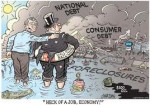How Is The Economy These Days?
 Two years from now, many of us graduating from business school will look back on the last few years and compare those economic times to those times at graduation. I applied to business school in 2009, which at the time was the hardest year for ever for MBA applicants. It was also the year where round one applications hit a record high at a number of top schools and the associated yield rates expanded class sizes to unprecedented levels (click here for my post on the 2009 economy). At the same time, recruiting in the legal world last year also took a plunge, and students were scrambling all year to find the summer associate positions that used to be guaranteed upon graduation from a top school. The question is, how is the economy doing these days?
Two years from now, many of us graduating from business school will look back on the last few years and compare those economic times to those times at graduation. I applied to business school in 2009, which at the time was the hardest year for ever for MBA applicants. It was also the year where round one applications hit a record high at a number of top schools and the associated yield rates expanded class sizes to unprecedented levels (click here for my post on the 2009 economy). At the same time, recruiting in the legal world last year also took a plunge, and students were scrambling all year to find the summer associate positions that used to be guaranteed upon graduation from a top school. The question is, how is the economy doing these days?
Well that’s one question that’s on everyone’s mind, because this past weekend was labor day, and so many people were talking about jobs and recruiting all across the country. Â A lot of people are still referencing the recession that officially ended in 2009 and left millions of Americans without jobs, many of which haven’t found their way back into full-time jobs today. The period is still considered one of the worst economic periods in recent history, if not the worst.
For factual reference, the Department of Labor statistics say that more than 6 million people have been out of work for the past half a year, which is about double the count of 3 million a year ago. What does this mean? Maybe it suggests that things have not gotten much better, and in fact actually gotten worse? Â Or maybe it suggests that the time it takes for the economy to recover will take a lot longer than we all think? Maybe it even suggests there were a lot of issues already swept under the carpet that were uncovered when everything came to a halt. Personally, I suspect all three probably play at least a small role (click here to hear what Robert Reich, former Secretary of Labor, said on Labor Day)
But the good news is at top MBA programs, like Kellogg, things seem to be on the rise. Incoming MBA students are pretty optimistic about their chances this year, not only here in Evanston but also across the U.S. at other top schools, which is the word I get from my friends. At law school things are finally starting to improve. This year is shaping up to be better than last year, and my classmates at Northwestern Law are still interviewing with firms in all geographies — Chicago, NYC, LA, DC, and the Bay, to name just a few — and others have already received offers from the very top firms.
On the other hand, it still seems like the recession was only here yesterday, so I think a lot of people aren’t quite “sold” on the idea that we’ve “recovered”. That’s especially true in law school, where the students are more risk averse, and where it was only last year that students felt the aftershock of the worst legal recruiting season ever.
It will certainly be interesting to see how everything plays out both at business school and at law school over the next few months. But one thing to keep in mind to all those applying to graduate school, to those currently in graduate school, and those already in the workforce post-graduate school, is that JD and MBA programs only represent a small subset of the population. The majority of the world isn’t afforded the opportunity to obtain a JD or a MBA degree, let alone both degrees and from a top school. Â And so instead of thinking just about just MBAs and JDs, we should also consider the economic implications of the economy more broadly.
In the end, it’s in all of our interest to reduce unemployment and obtain a more stable workforce. Because having a stronger and more stable economy depends on it.
No comments yet.






